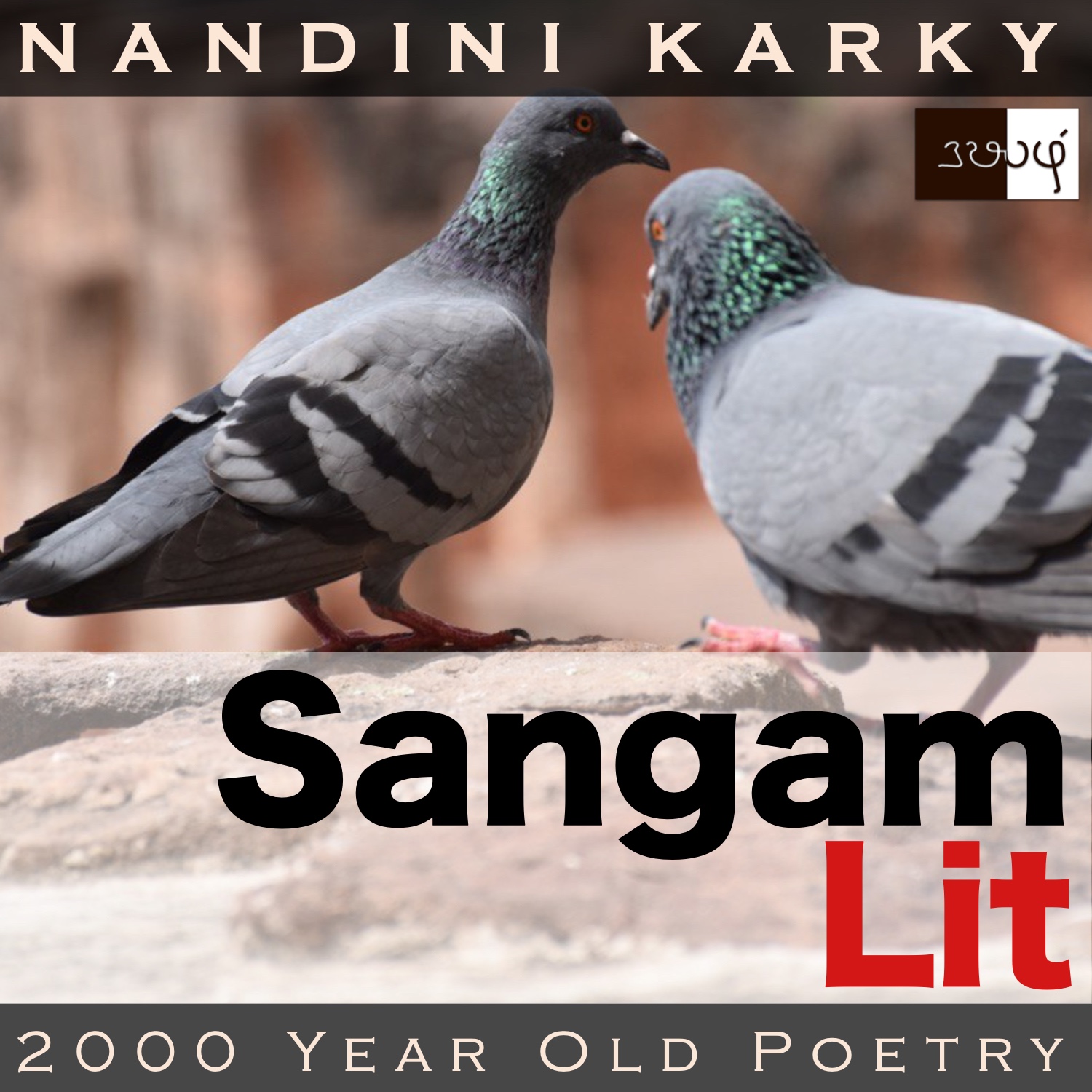Podcast: Play in new window | Download
Subscribe: Apple Podcasts | Spotify | Amazon Music | Android | iHeartRadio | TuneIn | RSS | More

In this episode, we understand perceptions about life and love depicted in Sangam Literary work, Natrinai 71, written by Vannapura Kantharathanaar. True to his colourful name, he vividly paints this poem of love in the canvas of the ‘Paalai’ landscape or the drylands, around the theme of separation. The verse converses in the words of the lady’s confidante to the man, putting forth an important question as he prepares to leave.
மன்னாப் பொருட் பிணி முன்னி, ”இன்னதை
வளை அணி முன்கை நின் இகுளைக்கு உணர்த்து” எனப்
பல் மாண் இரத்திர்ஆயின், ”சென்ம்” என,
விடுநள் ஆதலும் உரியள்; விடினே,
கண்ணும் நுதலும் நீவி, முன் நின்று,
பிரிதல் வல்லிரோ-ஐய! செல்வர்
வகை அமர் நல் இல் அக இறை உறையும்
வண்ணப் புறவின் செங் காற் சேவல்
வீழ் துணைப் பயிரும் கையறு முரல் குரல்
நும் இலள் புலம்பக் கேட்டொறும்
பொம்மல் ஓதி பெரு விதுப்புறவே?
Here lies a treasure trove of insightful words! Right at the beginning, is the gem-studded ‘மன்னாப் பொருட் பிணி’ meaning ‘affliction of seeking transient wealth’, to which we will return to, in a short while. Let’s turn our attention to another shining gem in ‘விடுநள்’ meaning ‘the girl who lets go’ as well as ‘இலள்’ meaning ‘the girl who lives in your home’. It’s in these Sangam poems, I perceive how close a person is to their action. These expressions seem to shout out from rooftops, ‘you are what you do’. Speaking of rooftops, we meet a word ‘இறை’, which refers to the sloping eaves in a house. And greeting our eyes, from these rooftops is the ‘வண்ணப் புறவு’ meaning ‘colourful pigeon’. Anyone who has glanced at the neck of a pigeon with its dazzling shades will surely agree with this moniker. Stunning is the way its mate is described as ‘வீழ் துணை’, meaning ‘desirous mate’. Why I call it stunning is because the word ‘வீழ்’ which means ‘desire’ here, also means ‘to fall’. I have always wondered why the expression is ‘falling’ in love! And here, I see two languages from different corners of the world nodding their heads in agreement. Moving on, let us travel further into these words to seek their deeper meaning.
The man intends to leave the lady to go in search of wealth. To him, the lady’s confidante says,“O lord, afflicted by the intention to seek that transient wealth, you say, ‘Please help your friend, the one wearing bangles on her forearms, to understand that I need to leave’. If you were to beseech her with many, great words, she may say, ‘Go’ and let you leave. Even if she were to say so, do you have the strength to stand before her, stroking her eyes and forehead to bid her adieu? On the inner eaves of the many-tiered houses of the wealthy, live colourful pigeons. When the red-legged male pigeon coos to its mate with desire, hearing that helpless sound of love in the air, even when she was living in the house with you, she would suffer uncontrollably and rush to be with you. Do you really have the strength to leave such a girl, with a fine appearance and flowing tresses, to suffer in your absence?” With these words, the confidante deftly urges the man to give up his plans of leaving the lady, to go in search of wealth.
Wealth and love seem to be sparring with swords in these words. As promised let’s delve a little more into the expression ‘மன்னாப் பொருட் பிணி’. Here, we see the confidante characterising this search for wealth as an illness and within this expression is also the added layer of understanding that wealth is transient. Indeed, money comes and goes. But, to call the man’s intention to go in search of wealth as an ‘illness’ brings forth a lot of questions. Was it such an affluent society that men didn’t really have to go in search of wealth? If they had all the money, what still pushed the man to go away to earn? Were they in such a flexible situation that they could happily abandon those plans and still lose nothing much? I wonder what it means to gather wealth two thousand years ago. Speaking of which, we get a tiny glimpse of the houses of the wealthy. The house seems to be in many levels, with sloping roofs, which turns out to be the resting abode of those red-legged, colourful pigeons. Where there’s food to spare, birds are sure to find a spot to live and love. When one such male pigeon coos for its mate, even before the female responds to it, we see the lady, with a delicate appearance and flowing tresses, rushing through the corridors of that house, seeking out the man, to be with him. A lady who cannot even bear even a minute’s separation from her man!
By painting a picture of the lady’s fervent love, the confidante seems to sow the seeds of doubt in the man’s mind, dissuading him from leaving for the sake of wealth. Through this verse, we glimpse at a time, when wealth and love were at great odds. Our dilemmas regarding these facets may not be as drastic as then. But perhaps, our takeaway is to see deeply the path we will leave behind in those times, when our mind pushes us to take a new turn in life!




Share your thoughts...